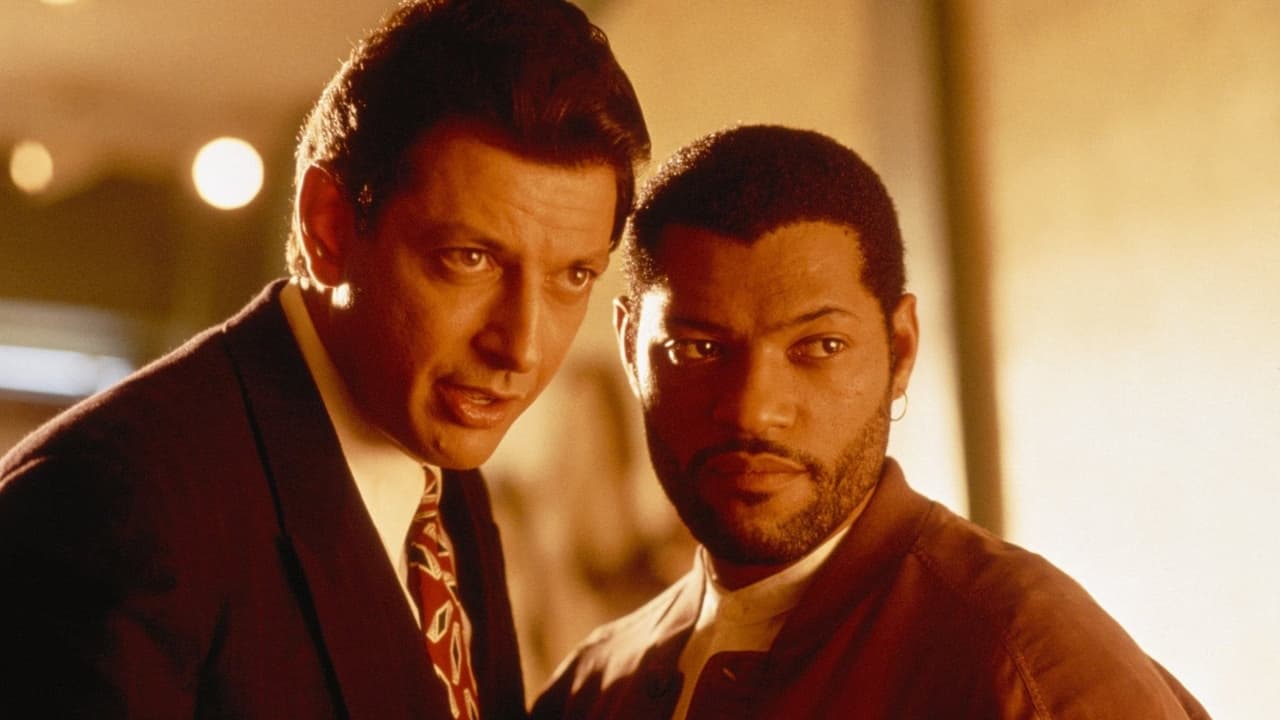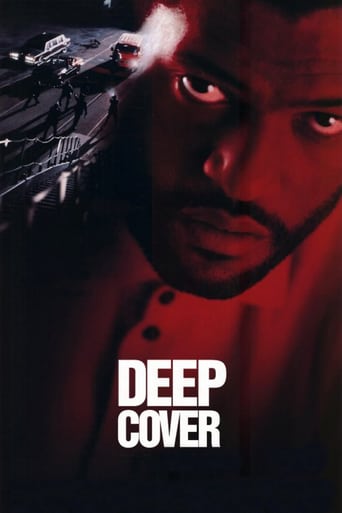

Sadly Over-hyped
... View MoreOne of the most extraordinary films you will see this year. Take that as you want.
... View MoreI think this is a new genre that they're all sort of working their way through it and haven't got all the kinks worked out yet but it's a genre that works for me.
... View More.Like the great film, it's made with a great deal of visible affection both in front of and behind the camera.
... View MoreDEEP COVER is a pretty predictable film about a cop going undercover to take down some drug lords, but in execution it turns out to be a fun little film and more entertaining than it has any right to be from that premise. The underrated Laurence Fishburne is a fine choice for lead, playing a guy who must come to terms with what makes him a man while exploring the moral quandaries in which he finds himself.This is a film packed with that inimitable early '90s style, with lots of hard-edged violence and even a little humour thrown into the mix. The narrative, although familiar, is very fast paced which makes for a nice viewing experience. Plus there's a big supporting role from a typically kooky Jeff Goldblum, who brings plenty of his trademark charm to the part. The only thing I wasn't keen on was the ending, which sees Goldblum acting out of character for plot necessity; otherwise, this is solid entertainment.
... View MoreBill Duke has had a long and illustrious career as an actor (X-Men: The Last Stand, Action Jackson, Predator), a producer and writer, and as a director (Hoodlum, Deacons for Defence, The Killing Floor). In what could have been a routine blaxplotation film, he gives us a compelling story that was a thrill to watch.That is not to say that the penultimate chapter could not be predicted a mile away by anyone who is familiar with our government and the fact that they would sacrifice American citizens for the sake of some tin-horn dictator. However, the final chapter in this film gives us some satisfaction as we see those agency scumbags and two-bit congressmen getting their due.Laurence Fishburne was magnificent as a cop sent undercover to bust drug kingpins. He goes deeper and deeper and soon there is no way to tell the difference. Is there a spark of humanity left inside? One can only hope.Jeff Goldblum was equally good as his partner in crime. Clarence Williams III was the best I have seen him as a cop, who was Fishburne's conscience.Great film about undercover police work and the effect it can have on a cop.
... View MoreAs far as I (the "me") am concerned, this is a really top 10 of the decade movie. Fishbourne gives an amazing, stellar performance that served to cement his reputation as a talented, malleable (to be lauded in an actor...) professional. To truly understand the content of this movie, you literally have to be thinking "Shakespearian" to put it in context. That he played Othello after is a rather pleasingly obvious choice. Put together hungry, ambitious actors and actresses, excellent writing that con-temporizes perennial concerns; combine with innovative, just beyond the current accepted edge cinematography; and you get Deep Cover. A deep symmetry and (of) actor sympathy (not necessarily in that order) reveals truths all but concealed by contemporary brusqueness. See the gd thing to appreciate it, and do it late at night. It is truly the sleeper of the last 2 decades; see it and be in on it.
... View MoreThis film is up there, indeed at times exceeds the Hollywood remake of the BBC miniseries, Traffic, as a no-holds barred merciless look at the medium echelons of the drug trade and the so-called war on drugs in the United States during its time. I only gave it only an 8 because it is not exactly classic cinema material, although it is a valuable addition to any film library.Technically, the film is remarkable for a strong performance from the lead and support cast - look out for a chilling performance by Gregory Sierra as Felix Barbosa. Charles Martin Smith, playing Laurence Fishburne's DEA handler, has got the federal bureaucrat part down pat - I'm afraid to say , as always since he tends to get typecast in only this kind of role. Lawrence Fishburne turned in a stoic yet raging performance that was believable and easy to root for. Only problem, is that he too ended up being type cast in largely the same persona. Jeff Goldblum, mercurial and sharp as always added a lot of the flair of the film. Also hats off to the woman who played Fishburne's single mother/drug addict neighbor (I didn't catch her name). The rest of the supporting cast really enriched the story.The cinematography and editing were very effective and innovative for their time. Choppy editing with successive close ups was soon picked up by many future copycat films. This film was one of the original ones to use that editing idiom. The soundtrack also worked well , reflecting much of the cynicism and despair that pervades the movie ; at some moments the score enhanced chilling situations audibly, as it were.All this means that Bill Duke (and the producers) did a very good job.===== WARNING: SPOILERS - Possible spoilers ahead ===== Now story-wise, this has got to be one of the grimmest scripts to make it to production at the time. After seeing a film like the Player, I was surprised how that script ever made it to the big screen. Kudos for letting this film be made, really.I won't repeat the outlines of the plot - you can read the plot summary for that. The story could sound as a cliché along the lines of "all i wanted was to do good as a cop but they turned me into a drug dealer." But it is not cliché at all. The script is so well paced that the stakes are periodically raised higher and higher, and the key moments of the film are timed such that they exert their full dramatic effect. The stakes are raised as high as they can be in the context of the story and the twists do not insult this viewer's intelligence. There were probably plot holes, but I missed them - I was busy enjoying the movie.--- end spoilers --- This film is too dark for children and even early teens, but for the rest of the world it is a thought-inducing and worthy film, as a drama, a social/political critique and as a thriller/action/cop flick.
... View More